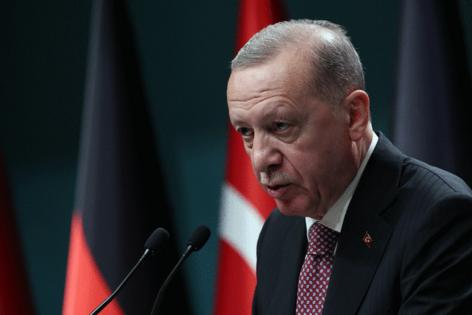Jailed PKK Leader open to working with Turkey, DEM Says
Published in News & Features
The leader of Kurdish separatist group PKK said he’s ready to cooperate with the Turkish government in a bid to end a long-running conflict that’s claimed thousands of lives, according to a statement by the pro-Kurdish Peoples’ Equality and Democracy Party, or DEM, on Sunday.
“Re-strengthening the Turkish-Kurdish fellowship has not only become a historical responsibility, but also of fateful importance and urgency for all peoples,” Abdullah Ocalan was cited as saying. “I am ready to take the necessary positive step and make the necessary call,” he said when a party delegation met him on Saturday at Imrali Island, where he’s been imprisoned since his capture in 1999.
“I have the competence and determination to contribute positively to the new paradigm that Mr. Bahceli and Mr. Erdogan are empowering,” Ocalan said in the statement, referring to the leader of the ultra-nationalist MHP party Devlet Bahceli and Turkish President Recep Tayyip Erdogan.
In October, Bahceli had called for Ocalan’s solitary confinement to be lifted and for him to be allowed to speak in parliament and urge the PKK to lay down arms. Erdogan supported his ally’s call.
Bahceli’s remarks were seen as an unexpected shift, given his party’s historically hard-line stance against the Kurdish movement. One day after Bahceli’s call, PKK attacked Turkish state defense firm Turkish Aerospace Industries Inc., killing five people. PKK said at the time that the attack had been planned “a long time ago” and wasn’t connected to the recent “political agenda.”
Although Ocalan no longer directs the PKK’s day-to-day operations, he’s still revered by the movement’s commanders. At the same time, any peace deal negotiated by him would mean little if the PKK refused to sign onto it.
The Kurdish-backed militant group, which has been waging a war for autonomy in Turkey’s southeast since 1984, is designated a terrorist organization by the U.S., Turkey and the European Union.
Turkey regards the armed wing of the Kurdish Democratic Union Party of Syria, known as the People’s Protection Units or YPG, as an affiliate of PKK.
YPG, which seeks autonomy for Syria’s Kurds, has shown a willingness to work with any power capable of advancing that goal. Syrian Kurds control a zone in Syria’s northeast.
On Sunday, Turkey’s Industry and Technology Minister Fatih Kacir announced a new initiative aimed at revitalizing the country’s southeast, an area long affected by clashes with the PKK.
The plan, to include $14 billion in investments over the next three years, focuses on agriculture in the region where the population is mostly Kurdish. The southeastern provinces, once a center of intense fighting between PKK and Turkish military, have struggled with underdevelopment and economic instability.
_____
©2024 Bloomberg L.P. Visit bloomberg.com. Distributed by Tribune Content Agency, LLC.







Comments